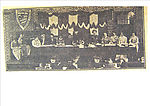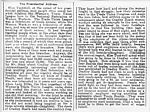 Gertrude Tuckwell
Gertrude Tuckwell NFWW conference at Workers' Institute 1912
NFWW conference at Workers' Institute 1912 Gertrude Tuckwell's presidential speech 1912
Gertrude Tuckwell's presidential speech 1912

Gertrude Tuckwell became a supporter of the 1910 Cradley Heath women chainmakers' strike, because she was involved in a whole movement to improve conditions at the workplace and educate women to their own needs. Mary Macarthur, who was deeply involved in organising the chainmakers' strike, was her close friend and colleague. Gertrude was Honorary Secretary, and later President, of the Women's Trade Union League (W.T.U.L.). In 1908 she became President of the National Federation of Women Workers (N.F.W.W.), and she was a leading figure in the Anti-Sweating League.
Gertrude visited Cradley Heath on a number of occasions. One such occasion was reported in the County Express in July 1912. As President, she took the chair at the annual delegate conference of the N.F.W.W. held at the Workers' Institute. The newspaper photograph of the platform is reproduced here, along with a cutting of her presidential address. In her speech she explained that she had long been interested in Cradley Heath, ever since her aunt, Emily Dilke, had visited the area some years earlier. Her aunt was a writer, suffragette and trade unionist. When she came to Cradley, she went into chainmakers' homes and watched them making chain. When she attempted to do the same, she was laughed at, but did not mind being laughed at for a three minute attempt when it took six months to learn to do it properly. Gertrude was one of the five original Trustees of the Workers' Institute.
Gertrude was born on 25th April 1861 in Oxford. She was the second daughter of Reverend William Tuckwell and his wife Rosa. Her father was master of New College School and chaplain of New College. Gertrude spent her childhood in Somerset and Warwickshire parsonages.
In 1878, while staying in Oxford, Gertrude met two women members of the London school board, and she decided on a career in teaching. She became a pupil teacher at a Liverpool training college, and did her teaching practice in the slums. After a year she moved to Bishop Otter College in Chichester. Her first teaching post was in Chelsea, where for six years she taught working class infants, resigning only when ill health made it too difficult for her to continue.
In 1893 she became labour secretary to her aunt Emilia, who was married to Sir Charles Dilke MP. The intellectual and political nature of this household provided the inspiration for her future work. Honorary secretary of the Women's Trade Union League and later its president, and president of the N.F.W.W., Gertrude also played a key role in the formation of the Industrial Law Committee. She campaigned to protect women workers from industrial injury, most notably lead poisoning and "phossy jaw". This was a disease contracted by many matchworkers, who inhaled phosphorus fumes. She personally investigated hazards in white lead mills. Gertrude also helped to form the Anti - Sweating League, one of the aims of which was to establish a statutory minimum wage.
Gertrude retired from women's trade union work in 1918, but she remained extremely active in public life, particularly in legal and public health related matters. She was appointed Companion of Honour in 1930. She was one of the first women justices of the peace, founder of the Magistrates Association and chair of the National Association of Probation Officers from 1933 to 1941. She also served on the advisory committee to the Ministry of Health, on the Central Committee on Women's Training and Employment. She was concerned with the alarmingly high maternal mortality rate and with May Tennant, set up the Maternal Mortality Committee. In addition she became president of both the Women Sanitary Inspectors and the Women Public Health Inquiry Committee, which in 1939 investigated the health of married women.
Gertrude Tuckwell died on 5th August 1951, at the age of ninety. She had spent the last twenty years of her life at Little Woodlands, Wormley, near Godalming, Surrey. Her life had been dedicated to the development of women's trade unionism and the labour movement. Her friend, Violet Markham, recalled her as "Tall and beautiful," adding that she was, "not only a highly cultured and distinguished woman, but she had a rare and tender nature, unswerving in its affection and loyalty". (Oxford Dictionary of National Biography 2004)
Rollover the captions in the box to see the available images in thumbnail format, click the caption to see the full-size image
| Reference: | 688 |
| Keywords: | Matchgirls |
| Archive Ref: | |
| Updated: | Thu 6 Sep 2007 - 14 |
| Interpretation written by | Barbara Harris |
| Author's organisation | |
| Organisation's website |